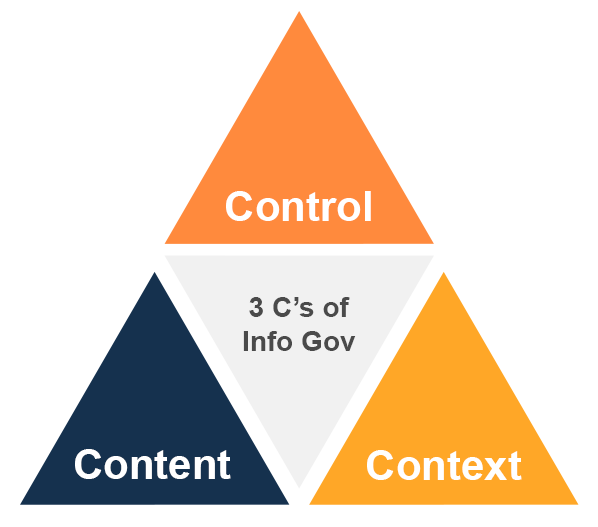Information Governance
Good Information Governance enables organizations to analyze, organize and control their enterprise data across a variety of use cases and locations, now and in the future.
Enterprises create more digital content today than they ever have in the history of the digital age, with some organizations graduating from retaining terabytes (1,024 GB) or petabytes (1,048,576 GB) of information to possessing exabytes (1.24 Billion GB) of electronic files.
The nature of business today dictates content lives in multiple repositories – both within structured repositories (ECMs, ERPs and databases) and unstructured repositories (emails and attachments, shared drives, collaborative sites and cloud storage environments).
The challenge in implementing a good Information Governance (IG) strategy lies in understanding what you have, where it is, what it is and what to do with or about it. The strongest solutions establish protocols and workflows on how, when and why to process data, with accountability and reporting at all levels.
What makes information management at an enterprise scale difficult is not only the sheer amount of data but knowing where and what that data actually is.
What is Information Governance?
Information Governance (IG) is the set of multi-disciplinary structures, policies, procedures, processes and controls implemented to manage information at an enterprise level, supporting an organization’s immediate and future regulatory, legal, risk, environmental and operational requirements.
– Wikipedia
Information Governance is the activities and technologies that organizations employ to maximize the value of their information while minimizing associated risks and costs.
– Information Governance Initiative (IGI)

A good Information Governance strategy employs file, content and document controls which are best-in-class solutions and practices for data organization and understanding within and across an organization’s varied data environments.
IG means full knowledge of all data, with defensible practices that define:
- What each piece of data is
- Where each piece of data is located
- How each piece of data is handled
- Why the organization has this data (i.e., how it is used)
A reliable IG program is critical for enterprises of all sizes
Knowing what you have, where it is and what to do with it allows organizations to:
- Comply with data privacy regulations by knowing where every piece of Personal Data is located throughout every repository
- Satisfy fiduciary, regulatory and compliance requirements by demonstrating defensible IG practices
- Be prepared in the event of an acquisition, merger, or divestiture
- Cost-effectively manage the demands of litigation, investigations and inquiries
- Reduce the amount of ROT (Redundant, Obsolete & Trivial) data under management
- Minimize storage costs by keeping and storing only what you need
- Meet published data retention requirements and achieve true content lifecycle management
- Reduce employee inboxes, personal files and abandoned content
- Properly sunset aging or out-of-support repositories and archives
- Intelligently migrate content to the cloud

Each organization’s IG and workflow needs are unique.
Valora works with you to understand your business and apply our proven IG methodology to your unique data environments. Best practices in workflow and systems design in combination with the PowerHouse AutoClassification Suite establishes a defensible IG strategy you can count on.
8 Pillars of Information Governance
ROT & Clean-Up
Classification
Data Migration
Data Retention
Legal Hold
eDiscovery
Data Privacy
Data Security
Valora’s PowerHouse AutoClassification Suite solves corporate Information Governance challenges with rich metadata attribute tagging and sophisticated rules-based machine learning to manage and action content across the enterprise.
AutoClassification
Learn best practices for the automation of document processing, analysis and disposition.
Legal & eDiscovery
Discover how Valora facilitates efficient risk mitigation, litigation and eDiscovery strategies.
Data Privacy & Security
Learn how Valora locates and actions PII and sensitive data across the enterprise.
Related Resources
Explore Valora Technologies’ Resource Library for helpful articles, videos, presentations, white papers, blog posts and more.
Managing Legal Hold with AutoClassification
Learn cost-effective solutions that solve the Legal Hold assignment and control process, all within the broader context…
PowerHouse AutoClassification
The world-class Machine Learning technology automatically determines document content, attributes & purpose,…
AutoClassification 101: The Epiq and Valora Technologies Webinar Series
Watch AutoClassification 101, the Epiq and Valora Technologies Webinar Series..
Organizing Multiple Divestitures with AutoClassification
Valora was engaged by a large, multi-national pharmaceutical company seeking a sophisticated file analysis solution to help sort through…



